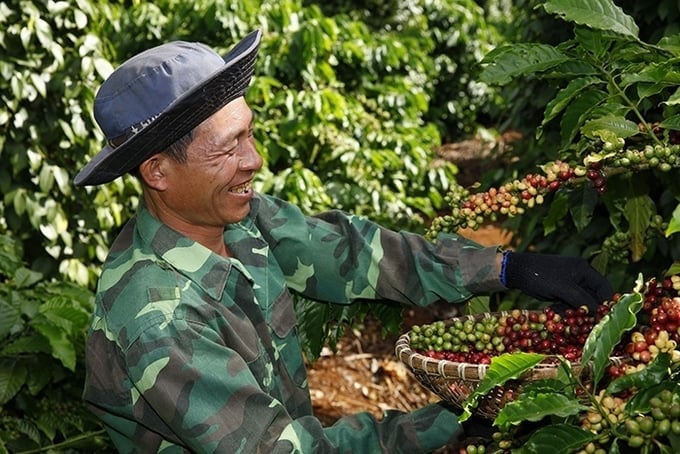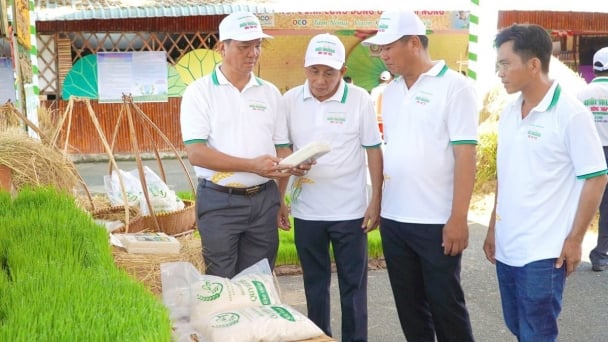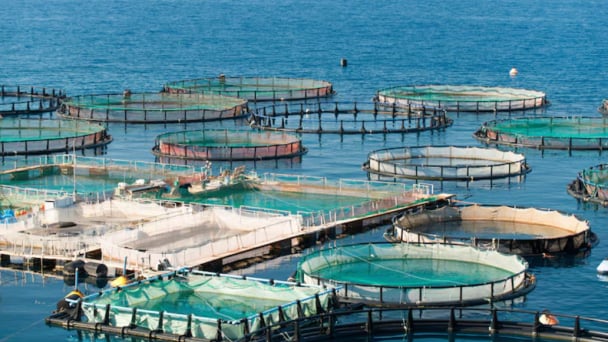June 8, 2025 | 00:12 GMT +7
June 8, 2025 | 00:12 GMT +7
Hotline: 0913.378.918
June 8, 2025 | 00:12 GMT +7
Hotline: 0913.378.918

The global NESCAFÉ Plan, launched by Nestlé Group in 2010, aims to deliver sustainable value to coffee farmers in key coffee-growing regions worldwide.
Recently, NESCAFÉ, Nestlé's largest coffee brand, published the second progress report of the NESCAFÉ Plan 2030. The report highlights that the increased adoption of regenerative farming methods has led to improved productivity and reduced greenhouse gas emissions.
In 2023, over 20% of NESCAFÉ's ingredients were sourced from regenerative farming practices. Data from the Rainforest Alliance's Sustainable Agriculture Standard, based on monitoring and impact assessments in 11 coffee-growing regions where NESCAFÉ operates
Results show that farmers in countries such as Vietnam, Honduras, India, the Philippines, and Thailand have achieved a 5-25% increase in coffee yield per hectare compared to 2022. Key measures contributing to this growth include optimized fertilizer use and soil cover techniques.
These practices have also helped reduce greenhouse gas emissions/kg of coffee by 15-30%. In 2023, the NESCAFÉ Plan distributed 21 million coffee seedlings to farmers to aid in coffee area rehabilitation and productivity improvement in the program countries.
Mr Philipp Navratil, Head of the Coffee Strategic Business Unit at Nestlé, stated that the NESCAFÉ Plan underscores the company's strong commitment to securing the future of coffee, which remains a top priority for NESCAFÉ.
This second progress report showcases the company's daily efforts to collaborate with partners, suppliers, and farmers in coffee-sourcing regions, providing motivation to continue striving for better outcomes.
Prioritizing knowledge transfer and skill enhancement is crucial for promoting regenerative agriculture. In 2023, over 140,000 coffee farmers in 16 countries where Nestlé sources coffee received comprehensive training in regenerative agricultural practices and technical support.
For example, in Honduras, 12,000 young farmers were trained in entrepreneurship, quality management, and regenerative farming practices, equipping the next generation of farmers to manage farms more effectively.
Recognizing the importance of mutual learning, the NESCAFÉ Plan launched an online platform called Agrinest. This platform aims to connect farmers globally, allowing them to share knowledge and collaborate more effectively.
Currently, over 1,600 farmers in Vietnam and 240 farmers in Indonesia actively use Agrinest, with participation expected to grow.
Nestlé has also contributed to a handbook titled “Regenerative Agriculture for Low-Carbon and Resilient Coffee Farms – A Practical Guidebook”.
Compiled by the International Alliance of Biodiversity and CIAT (International Center for Tropical Agriculture), this handbook provides agronomists, trainers, and experts working with coffee farmers with a set of best practices to use and adapt to different farming contexts, assisting farmers in transitioning to regenerative agricultural methods. The guide is widely available within the coffee industry.
Ms. Mai Thi Nhung, a female leader of the farmers' group under the NESCAFÉ Plan, shared her experience using bottles to measure soil moisture during cultivation. This practice helps save irrigation water and reduce costs.
In Vietnam, since 2011, the NESCAFÉ Plan has been implemented by Nestlé Vietnam in the Central Highlands provinces. This initiative is based on a partnership with the Ministry of Agriculture and Rural Development, the Western Highlands Agriculture and Forestry Science Institute, and the Agricultural Extension Centers of these provinces. It aims to support coffee farmers in practising regenerative agriculture.
To date, the program has conducted over 355,000 training sessions on sustainable coffee cultivation for farmers. It has supported an average of more than 10,000 farming households each year from 2011 to 2023, distributing over 74 million high-yield, disease-resistant, and drought-tolerant coffee seedlings to help rejuvenate old coffee areas.
By adopting coffee farming methods aligned with regenerative agriculture, the program has enabled farmers to save up to 40% on irrigation water, reduce chemical fertilizers and pesticides by 20%, and increase their income by 30-100%.
The program has also established 274 farmer groups, with over 30% of these groups led by female farmers. These women receive comprehensive professional training and subsequently pass on their knowledge, inspiring the farming community to practice sustainable agriculture.
Over 12 years, through the NESCAFÉ Plan program implemented in the Central Highlands provinces, Nestlé Vietnam has distributed more than 73.5 million disease-resistant and high-yield coffee seedlings for replanting purposes. Along with the project, farmers have reduced irrigation water usage by 40% to 60% and decreased the use of pesticides and chemical fertilizers by 20%. They have also adopted intercropping techniques with coffee and pepper plants, enhancing land use efficiency, improving ecological diversity, and reducing environmental emissions.
As of 2023, surveys showed that 90% of the surveyed gardens used natural shade trees, and 86% of the gardens diversified crops, with an average of three different species.
Translated by Hoang Duy

(VAN) Dong Thap has launched a meeting in response to the Action Month for the Environment under the theme 'Live Green - Join Hands for a Green Economy' at Tram Chim National Park.

(VAN) The ocean has the capacity to absorb millions of tons of carbon, provided that mangrove forests, coral reefs, and biodiversity are protected.

(VAN) Technology is redrawing the map of Vietnamese aquaculture: more modern, greener, and more sustainable.

(VAN) Novel process harnesses machine learning to reveal groups of genes that determine how efficiently plants use nitrogen.

(VAN) Several scientists and farmers are experimenting with soil treatment in some key durian-growing regions such as Cai Lay (Tien Giang), Dak Song, Gia Nghia, and Dak R’lap (Dak Nong).
/2025/05/25/4127-3-073637_820.jpg)
(VAN) Thanks to the promotion from an FAO-implemented project, vegetable production in greenhouses in Moc Chau has seen strong development, from 1.5 hectares in 2021 to nearly 50 hectares in 2024.

(VAN) FAO has recently supported USD 140,000 to implement the project 'Risk mitigation human-animal interface risks through disease control initiatives in pig farming.'